Inside the ‘secret’ £10m medicinal cannabis factory

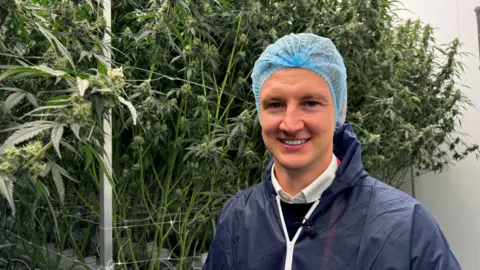 BBC
BBCSince it was legalized in the UK, the number of medicinal cannabis prescriptions has increased. With demand showing no signs of slowing down, one company has ambitions to take production of the drug to a new level.
The BBC has been allowed access to the factory on the condition that the location remains secret.
To enter, we must prove our identity, pass through two secure gates and, finally, through a bulletproof door.
The security team is ex-servicemen.
“We have hundreds of CCTV cameras all over the place – all infrared,” says James Leavesley, one of Dalgety’s founders.
According to the company, this high-tech facility is the first in the UK where cannabis can be grown, packaged and sold directly to pharmacies from a single location.
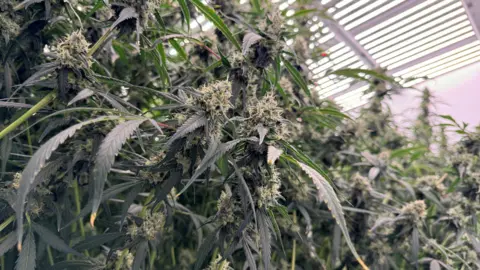
James first became interested in growing legal cannabis six years ago.
Although he comes from an agricultural background, he worked in the oil and gas industry for many years.
In 2018, When cannabis was legalized for medicinal use in BritainThe apparent demand for medicine caught his attention.
“A government survey revealed that 1.8 million people in the UK are sourcing illicit cannabis to help ease their medical conditions,” he says.
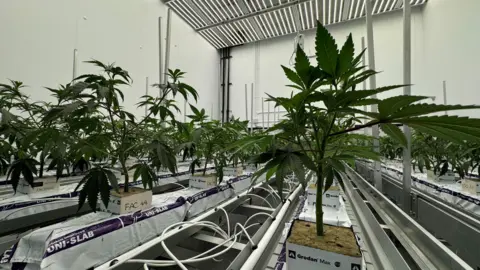
That same year, he sat down at a dinner table with his father and a family friend to discuss the issue.
The friend revealed he was also keen to get into the cannabis sector – so they decided to go into business together and formed Dalgety.
However, crucially, they needed someone with real-world experience of producing cannabis on a large scale.
They looked to Canada, where the drug has been legal since 2018.
“We knew we wanted to look outside the UK and find a skilled producer, and Canada has been at the forefront of this for a long time,” says James.
“Growing hemp really is completely different from any other crop and we wanted someone who had experience.”
After extensive research, he decided to seek out a grower named Brady Green.
Brady had previously designed and established several licensed cannabis facilities in his native country, James says, and was renowned for his work.
Before being recruited as a lead producer, he worked as a consultant for the company for three years.
Brady designed the entire set-up, including the strong security needed to protect the site.
“We have various access control points, restricted access (controls) as to who can let staff and visitors into certain areas,” says James.
“With the volume of cannabis we are growing on the site, it is really important that the UK Home Office has the reassurance that we take our security measures seriously.”
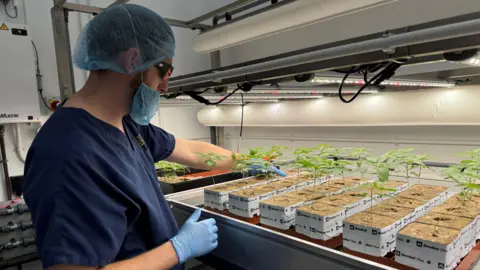
Despite the heavy investment of James and his business partners, there was no guarantee of success in their efforts.
Growing and selling cannabis legally requires a license from the Home Office and the UK Health Protection Agency (UKHSA).
Cannabis must also be grown according to a certain standard, and sent for testing before being approved for sale.
But James and his partners were convinced that it was worth the risk given the strong growth of markets in countries such as Canada, the US and Germany.
“We knew there was going to be a demand for the product,” says James.
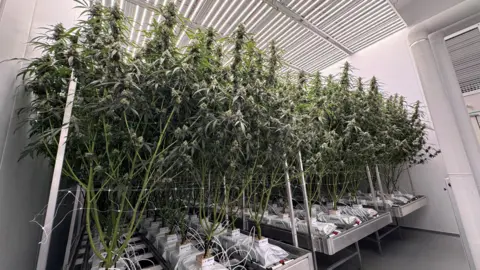
In January 2023, Dalgety obtained a Home Office license to grow cannabis and in April of that year he began cultivating it.
The crops grown were clones – genetically identical – but despite this, multiple batches had to be tested to ensure that the product was consistent.
In total, more than 600 samples were sent Medicines and Healthcare products Regulatory Agency (MHRA),
The business had spent £8 million to £10 million to get to this point, so the stakes were high.

inside the factory
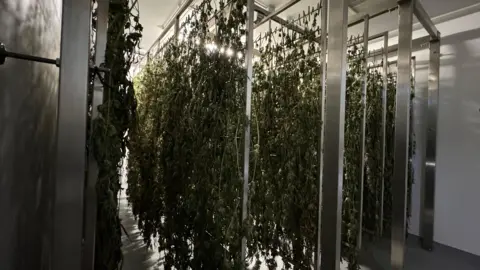
I’m expecting to walk into a cavernous room filled with cannabis plants and an overwhelming smell.
Instead, I found a series of hospital-style corridors, each leading to several small laboratories.
“The lighting is specially arranged, and we actually create artificial air in the room to ensure there is no microclimate,” says James.
It’s so bright, we’re issued a pair of specially made goggles to protect our eyes.
James explains that it takes about 12 to 14 weeks to create the finished product.
Two of those weeks are spent in the drying room. As soon as the door opens, the surroundings are noticeably different – darker and cooler.
Once dried, the plants must be prepared before packing.
James takes us to a large laboratory where there are six people, wearing overalls, hair nets and gloves.
They have been selected because of their experience in agriculture or interest in business.
The flowers will be packed and sent to the patients.

‘Two industries in one’
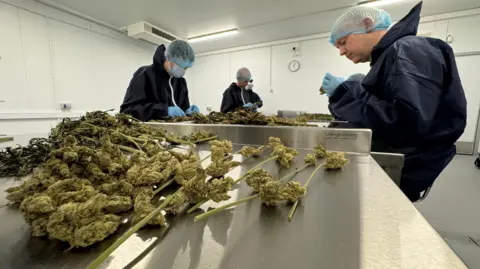
In September this year, James and the team secured their second license, allowing them to sell cannabis.
James believes the challenge of obtaining both licenses is the reason no one has been able to build an “all-in-one” facility.
He says, “It’s almost two industries merged into one, so it’s an agribusiness and it’s also a medical and pharmaceutical business, and most people have the ability to specialize in one or the other, but Not in either.”
The company aims to launch its product in the market in January. At this point, James says they’ll be able to produce enough for 4,000 prescriptions per month — and the company already has partnerships with prescribers and clinics.
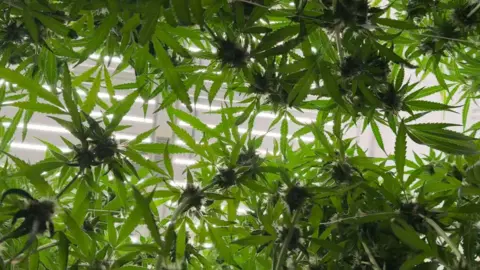
There are currently approximately 50,000 users of medicinal cannabis, obtaining prescriptions from 33 private pharmacies.
However, Too few people are being given medicine on the NHS,
This is because not all medicinal cannabis products have been approved for use by the National Institute for Health and Care Excellence (NICE). Those that are, use only certain parts of the plant.
Specialist NHS doctors can prescribe unapproved products if they think the patient will benefit, but they have to ask NHS England to pay for individual cases and are often rejected.
Private specialists may prescribe products not approved by the NHS, but this often comes at a high cost to patients.
A gram of legal medicinal cannabis in flower form costs between £5 and £10.
If an average patient consumes 0.5 grams per day, this could add up to £150 per month.
The average price of illicit cannabis is widely reported to be around £10 per gram.
But legal clinics also require patients to attend regular checks, which can cost at least £180 a year.
To qualify for prescriptions through legal medicinal clinics, patients must first try other medications without success.
The Department of Health and Social Care said that more research was needed into the effects of medical cannabis before any changes could be made to the way it is prescribed on the NHS.
A spokesperson for NHS England said: “The NHS already offers a number of licensed cannabis-based treatments that have been proven clinically effective, are approved by the medicines regulator and recommended by NICE.
“Many doctors and professional bodies remain concerned about unlicensed products, and manufacturers should be involved in the UK medicines regulatory process to seek licensing and provide doctors with the confidence to use their products.”
Who uses medicinal cannabis?

Laura, a teacher from Nottinghamshire, has purchased cannabis on the black market in the past to help with various medical conditions.
“Mostly musculoskeletal, but I have massive nerve damage,” she says. “There are a lot of things going on that cause me pain every day and difficulty walking.”
Laura is not her real name – she has chosen to remain anonymous due to the stigma of drug use.
His condition was so painful that he was given the strongest drugs, including ketamine.
After being referred to a specialist doctor, it was suggested that she might want to consider the use of cannabis.
“I had to decide whether I wanted to do something that would jeopardize my career or make me feel good,” she says.
She started using cannabis illegally, but was concerned about not only its legality, but also its safety.
“You’re talking about drugs that you buy off the street, you don’t know what type they are, you don’t know their strength,” she says.
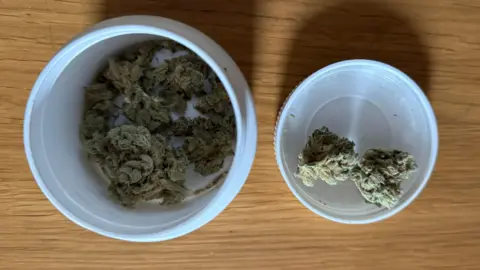
When legal cannabis pharmacies emerged, Laura applied for a prescription.
After trying a few different companies, she now uses a UK-based pharmacy that operates online.
She says she’s not sometimes worried about side effects associated with the drug — like impaired thinking or memory problems — because legal cannabis is grown in clean conditions, while black market product may contain contaminants. .
And because the drug is prescribed and monitored by a doctor, she says its use is well managed.
But if there were any long-term negative consequences, they felt the benefits would outweigh them.
“I wouldn’t want to be without it because I would be in a lot of pain,” she says. “If I’m up late and I haven’t eaten, I start to feel pain.”
Despite the relief she has found from cannabis, Laura is unable to tell anyone apart from her close family and friends.
“It still feels a little weird to me to do it in public,” she says. “I find myself hiding out with my portable vaporizer to fill it up or opening tubs of medicine. One issue is that many people think anyone who takes marijuana is a stoner.”






